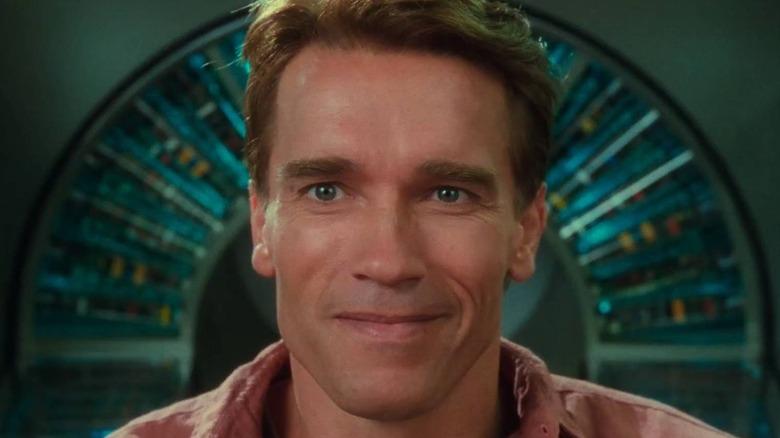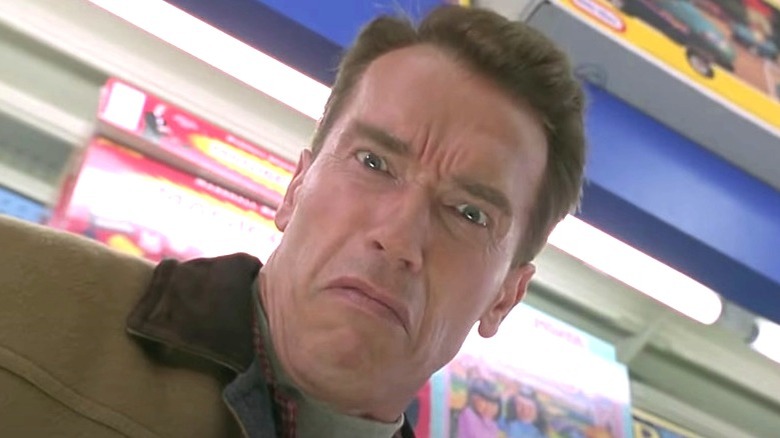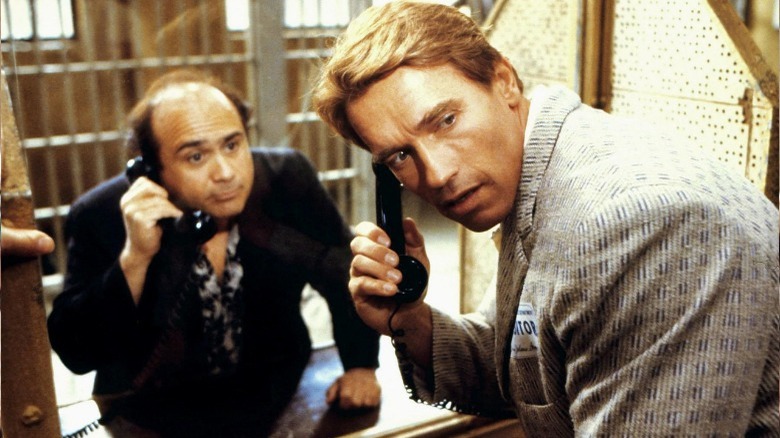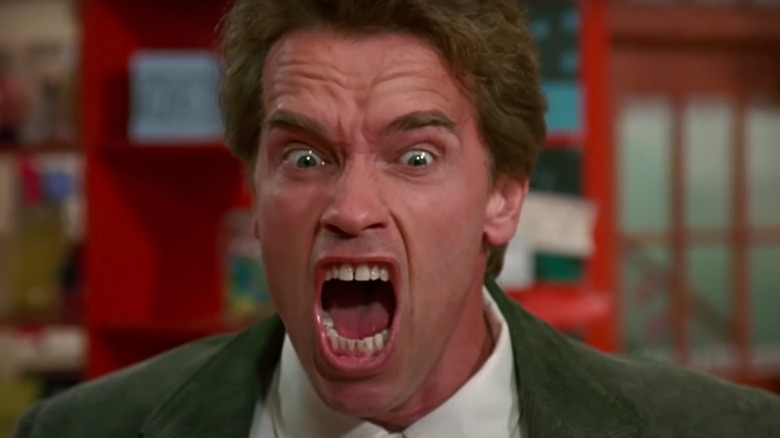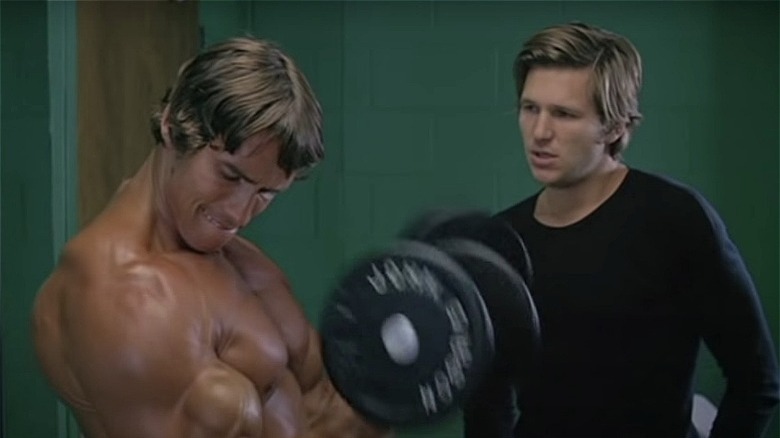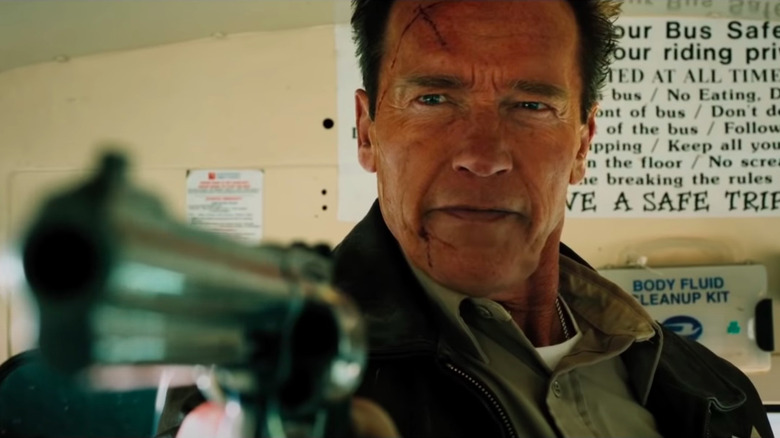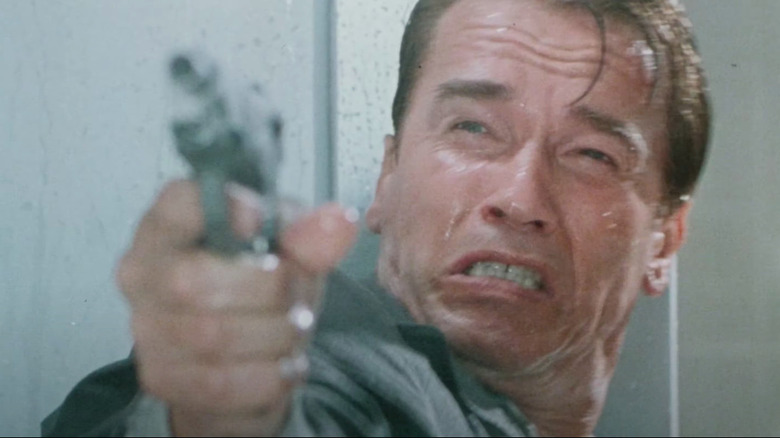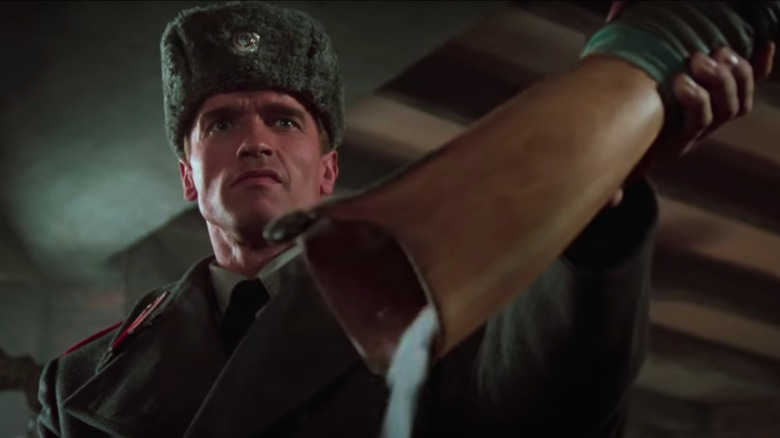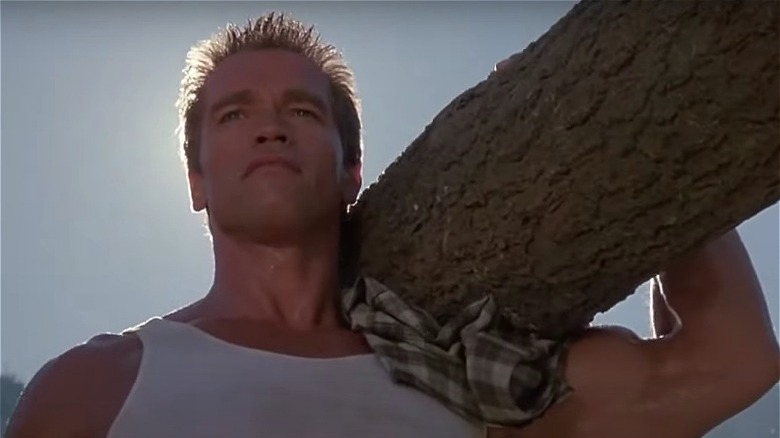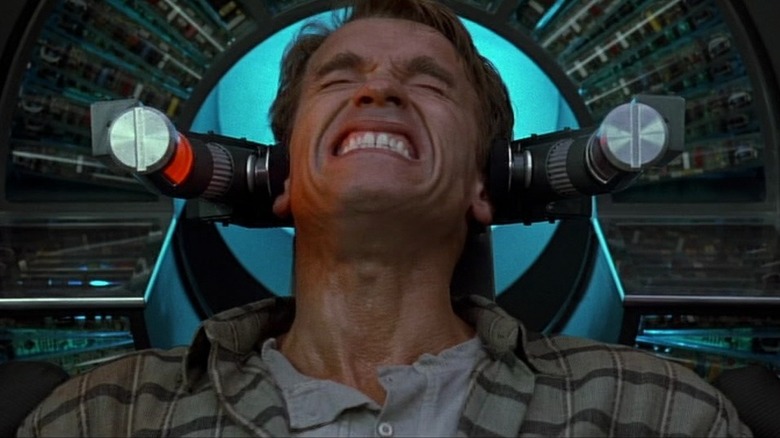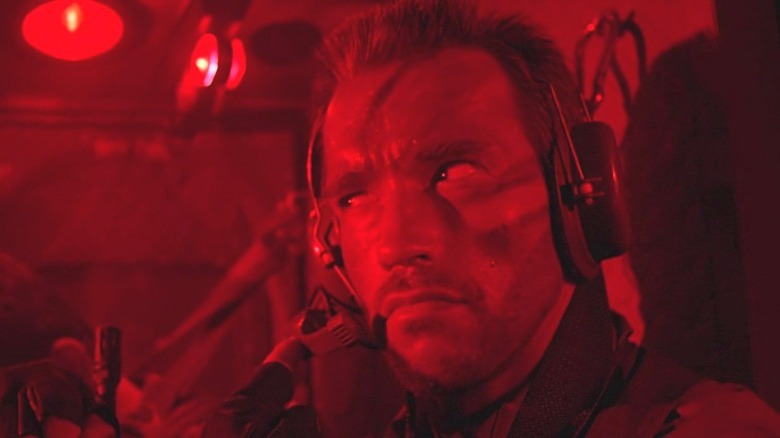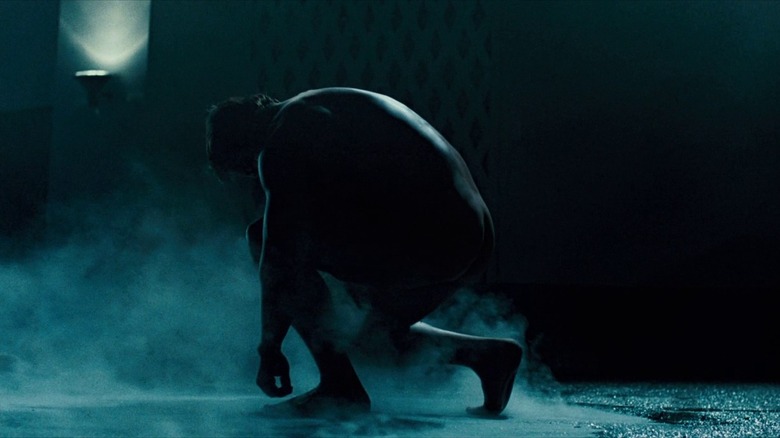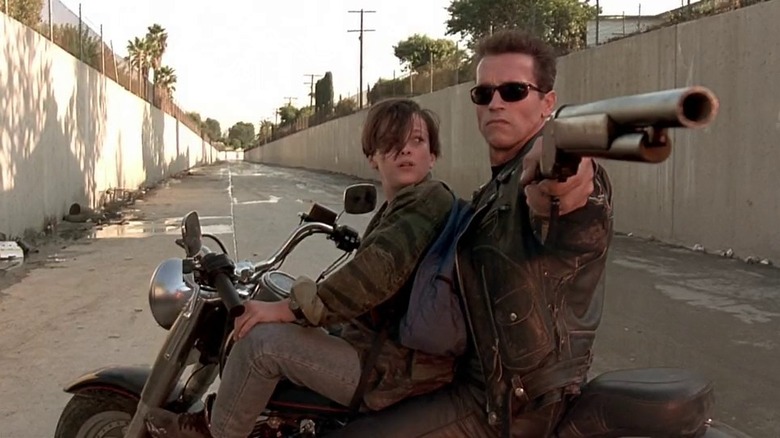The 12 Best Arnold Schwarzenegger Films, Ranked
Arnold Schwarzenegger is a man of three careers. His first one, bodybuilding, began not in southern California but in the village of Thal, Austria, through which I passed on a scorching summer day in June 2022. His childhood home has been turned into the Arnold Schwarzenegger Museum, which hosts a range of Arnie memorabilia on the first and second floors.
After doing some press ups on Arnold's lawn and a few dumbbell rows in his hallway, I posed by a statue of the Austrian Oak as Peter Urdl, Schwarzenegger's childhood friend and the former Mayor of Thal, took my photograph. Thoroughly inspired by all of this, I walked bare-chested through the village, basking in the glorious sun.
It was at this moment that I thought, "What are the 12 best Arnold Schwarzenegger films?" "Terminator: Genisys" was absolutely not going to be included. That much I was certain of. But what else would I omit? And what would I include? After much consideration, my list came together — here are the results.
12. Jingle All the Way
I understand that starting this list with "Jingle All the Way" may harm my credibility, but stay with me. Obviously, "Jingle All the Way" is a compromised piece of filmmaking, but is it any worse than "Raw Deal," "The Running Man" or "Last Action Hero"? Maybe. Okay, yes, it is. But those films are just pale imitations of Schwarzenegger's best work in action and sci-fi films; at least "Jingle All the Way" is something different.
Like most Schwarzenegger films, the plot is simple. Arnold plays Howard Langston, the proverbial workaholic family man. In an attempt to make things right with his young son, Jamie, Langston ventures to the store to buy a Turbo-Man action figure, the latest hyped up Christmas toy. The only problem is that it is Christmas Eve and stocks are critically low, so Langston must hit the road in the company of Myron (Sinbad), another desperate father who thwarts his attempts to secure the plaything at every turn.
BBC film critic Mark Kermode called "Jingle All the Way” a "crassly commercial, exploitative film," but we shouldn't neglect the fine satirical qualities on display here. Take the moment in which Arnold asks a toy store clerk, "Excuse me, I'm trying to find a Turbo Man dauhhl," causing the clerk — and then the whole store —to laugh hysterically. This is similar to the moment in "American Psycho," that brutal send-up of the American yuppie, in which Patrick Bateman attempts to book a table at the ultra-chic Dorsia, only to be met with jeering laughter.
11. Twins
Schwarzenegger's first attempt at comedy remains one of his best. Granted, that's not saying a lot, but "Twins” is not without its charms. Besides, the Austrian Oak is a better comedic actor than he is given credit for. Here, Schwarzenegger proved that, despite being a seven-time Mr. Olympia winner with a higher body count than just about any other Hollywood actor, he is also capable of being Julius Benedict, an amiable dork and twin brother to Vincent (Danny DeVito), a diminutive but wily con artist.
This farcical chalk-and-cheese dynamic worked better than Universal producers expected. As Arnold explained to Graham Bensinger, studio execs were wary of risking capital on a Schwarzenegger comedy, so the action star forewent a salary, opting instead for a cut of the box office. That turned out to be a very lucrative investment.
That success is largely thanks to the two leads' chemistry. Schwarzenegger's critics may have rolled their eyes, but there is a blundering charm to his performance, which is more than bolstered by DeVito's impish skulduggery. Yet one shouldn't lavish too much praise on this rather frothy experience. Frankly, the best way to watch "Twins" may be picking out key moments rather than viewing it from start to finish. I wonder how the sequel will turn out.
10. Kindergarten Cop
After the enormous success of "Twins," which scored a box office take 14.4 times larger than its budget, another project with director Ivan Reitman was a given. That project was "Kindergarten Cop." In their first film together, the gag was Arnold playing an ingenuous 230-pound dork. In their second, the hook was more high-concept: What would happen if Schwarzenegger became a kindergarten teacher? Well, Arnie tackled the role with the same enthusiasm that he brought to the T-800, and the results are mixed.
The film opens not in a kindergarten class, but rather in a grimy New York crack house, which Officer John Kimble (Schwarzenegger) blasts through with a pump-action shotgun. He's there to find a young woman who can identify Crisp (Richard Tyson), a drug dealer and suspected murderer with links to Astoria, Oregon.
Without getting bogged down in the plot details, Schwarzenegger soon finds himself undercover in an Astoria kindergarten class. His interactions with the kids added numerous memorable lines to the Schwarzenegger phrase book, namely "It's not a tumor," "There is no bathroom!" and simply, "Shut up!"
9. Stay Hungry
An oddity in Schwarzenegger's filmography, "Stay Hungry" is an earthy little Southern drama from 1976. It was Schwarzenegger's third film role, following a starring part in the atrocious "Hercules in New York" and a cameo appearance in "The Long Goodbye." As he starred opposite Jeff Bridges and Sally Field, "Stay Hungry" was a marked improvement for Schwarzenegger, who played a version of himself named Joe Santo, an Austrian bodybuilder living in Birmingham, Alabama.
There's an odd energy to "Stay Hungry." It's a weird mix of comedy, drama, and nudity. Broadly, it is about Southern rich kid Craig Blake (Jeff Bridges) favoring people over profits. Blake is tasked with buying a gym by his employer, who wants to demolish the building, but changes his mind after befriending Santo and his friend Mary (Sally Field), with whom he has a romance.
Not a performer known for his dramatic range, Schwarzenegger manages to keep it together as Santo, which is a fairly minor part. Though "Stay Hungry" may be a bit of a non-starter, it is worth watching just to see a young Schwarzenegger play a normal dramatic character rather than an omnipotent he-man, something the actor wouldn't do again until films like "Maggie" and "Aftermath."
8. The Last Stand
Schwarzenegger's best film since he left office, "The Last Stand" is a robust little actioner with a neo-western flavor. Sheriff Ray Owens (Schwarzenegger) polices the sleepy town of Sommerton Junction, Arizona, after his long career with the LAPD ended in tragedy. His low-key existence is upended, however, when Owens gets word that Gabriel Cortez, an international drug lord, has escaped from custody and is barrelling towards Sommerton in a Corvette with some help from a gang of henchman led by the gleefully cruel Thomas Burrell (Peter Stormare).
In handling the Governator's return to cinema, "The Last Stand" takes advantage of Schwarzenegger's action-star persona while acknowledging that this is no longer the 1980s. This shtick hits its peak when Arnold, being shot at from every angle, throws himself through the doors of a diner, knocking them off their hinges. "How are you, sheriff?" asks the homely server. "Old" replies a weary Schwarzenegger, having never lost his signature accent.
7. True Lies
The most recent collaboration between Schwarzenegger and James Cameron, "True Lies" is a big budget spy film replete with all kinds of wildness, from horses in elevators to lap dances featuring Jamie Lee Curtis. The story is riddled with absurdities, but this is a film about set pieces, not credibility, and "True Lies" boasts some of the biggest action scenes of Schwarzenegger's career. Also notable is its blend of action and humor, which even by Arnold's standards is particularly slapstick.
However, as spectacular as it may be, "True Lies" is a bit of an outlier in Cameron's career. It does not have the vision and innovation of his other work, particularly "Terminator 2," "Titanic," and "Avatar." Instead of trying to depict something that's never been shown on screen before, "True Lies" is an homage to the spy thrillers of Cameron's childhood. "I love James Bond," Cameron said in a behind-the-scenes featurette, "especially the older ones. I wanted to get a sense of that." And yet, while it may be one of Arnold's middling entries, "True Lies" is still one of the most bombastic action films of the '80s and '90s.
6. Red Heat
Walter Hill always believed in Arnold Schwarzenegger. "Everyone thinks it's his muscles," Hill told the Chicago Tribune, "It's not that at all: It's his face, his eyes. He has a face that's a throwback to a warrior from the Middle Ages or ancient Greece ... They just love to see this guy win."
As a result of this belief, Hill cast Schwarzenegger in "Red Heat" not as another American patriot but as a zealous Soviet police officer, which was a tough sell in the United States of the 1980s. Indeed, that may explain why the film grossed just under $35 million. However, "Red Heat" is not only a pretty good entry in Schwarzenegger's filmography, it also contains one of his most interesting performances.
Following the buddy cop formula that Hill popularized in "48 Hrs.," Schwarzenegger plays Captain Danko, the straight man, against James Belushi's Detective Sergeant Ridzik, a coffee-fuelled, chain-smoking Chicago cop. Thanks to Hill's direction, Danko is one of the few Schwarzenegger roles in which the character comes before Arnold's on-screen persona. That's not to say Arnold doesn't take out the trash, though. He does, both with his bare fists and a .44 Magnum.
"Red Heat” is interesting for a couple of other reasons, too. First, there's the score by James Horner, whose synthy compositions are best represented by "The Hotel," with its ominous chords and crashing drum beat. Then there's the geopolitical significance. Sections of "Red Heat" were shot in semi-secret in the USSR, including scenes in Moscow's Red Square, where Schwarzenegger was dressed in full Soviet uniform and attracted the attention of nearby guards, according to producer Andrew Vajna.
5. Commando
Released a year after Schwarzenegger's laconic performance in "The Terminator," "Commando" was the first film to fully exploit the absurdity of Arnold Schwarzenegger, with his mountainous physique, Teutonic accent, and playful sense of humor. "I'll be back" may have been his first one liner, but "Commando" established Schwarzenegger as a true quip-artist.
The film cost around $9 million to make, which was roughly $3 million more than "The Terminator," and yet "Commando" is the cheaper looking movie. That's part of its charm. After all, "Commando" is pretty much an exploitation film, albeit one with a cheekier sense of humor than most. However, it's also the ultimate Schwarzenegger vehicle, playing up every excess with neither shame nor reservation.
"Commando" was certainly an enjoyable contrast to what Sylvester Stallone was doing in the other big actioner of 1985, "Rambo: First Blood Part II." Now, John Rambo does go through a lot in that film; he's exploited by the U.S. government and loses his love interest to enemy gunfire. But having your daughter kidnapped by a Latin dictator isn't a cakewalk either, and John Matrix manages to make punny jokes as he blasts the 81 people responsible, which makes "Commando" the better spectacle. What both films do have in common is that they're both great marketing materials for the M60 machine gun.
4. Total Recall
"Total Recall" is a swan song for a bygone era of blockbuster filmmaking, and Schwarzenegger was the star who carried the baton from this film to the one that heralded Hollywood's new approach to high-budget spectacles, "Terminator 2: Judgment Day."
Specifically, I'm talking about practical effects. Just a few years before Hollywood embraced the wholesale application of CGI, "Total Recall" was a $100 million film that used prosthetics and miniature sets on a huge scale. As Corridor Crew observes, the effects team on "Total Recall" filmed their miniatures with elaborate parallax shots, creating immense Martian vistas that were so meticulous that a five-second shot could take hours to capture (via Studio Canal).
Aside from being the end of an era, "Total Recall" is also a whale of a time. It's a high-energy romp that perfectly marries Schwarzenegger's breezy star quality with director Paul Verhoeven's earthy, violent aesthetic and brutal sense of satire. It's not a subtle film, but it is a fun one.
3. Predator
"Predator" is about genre, not story. There is a narrative, of course — something about elite soldiers rescuing hostages in a jungle wilderness, where an alien begins to hunt them down — but it's all in service of the film's playful blurring of the boundaries between action, horror, science fiction, and shameless bravado. John McTiernan's film is a brawny cocktail of all of those, and it excels in each of them.
As with successful films, the cast and crew of "Predator" suffered for their art. "Pure hell," said Sonny Landham, "They don't put this in acting class. They'd have a bigger drop-out rate." Landham, who played pointman Billy Sole, was referring to the harsh conditions of the Mexican jungle, where filming of "Predator" took place over the spring and summer of 1986.
The maladies were numerous. For example, while scouting for places to put the camera, director John McTiernan fell out of a tree and broke his wrist. When he wasn't being attacked by spiky tropical bushes, Arnold came down with a terrible stomach bug, as did members of the crew. "I will spare you the details," Schwarzenegger told Reddit, "but while I was on a run, the runs hit. I ran to the side of the road and some cars driving by got quite the show."
Danger came not just from the environment, but from Schwarzenegger's fellow actors, too. As McTiernan explained, when Landham was cast, "the insurance company wouldn't let us hire him unless we got a bodyguard for him. Now, the bodyguard was not to protect Sonny. The bodyguard was to protect other people from Sonny."
2. The Terminator
The T-800 was a bolt from beyond for Arnold Schwarzenegger's acting career. Like his predecessors Steve Reeves and Reg Park, Arnold had already established himself as a sword-and-sandals star with "Conan the Barbarian," which did good business at the box office. However, as Arnold mentioned at San Diego Comic-Con, it was "The Terminator" that "really launched my action movie career" (via Associated Press).
It all started in a Rome hotel room where James Cameron, then known for directing "Piranha 2: The Spawning," was suffering from an acute case of the flu. As he laid there, sweating and dreaming, Cameron pictured a "chrome skeleton emerging from a fire," according to the BFI. When he woke, he sketched an image of a metal skeleton dragging itself along a tile floor, a scenario that was replicated in the film's white-knuckle ending.
When Cameron and Schwarzenegger met, Arnold wanted the role of hero Kyle Reese, as he was reluctant to play a villain so early in his career. However, he described his vision of the T-800 so persuasively that Cameron, who was impressed by the "strength of his face" more than his physique, told producer John Daly, "He's wrong for Reese but he'd make a hell of a Terminator."
Eventually, the tentative roots of "The Terminator" came together, giving birth to one of the greatest one-two punches in cinematic history (the less said about the rest of the franchise, the better).
1. Terminator 2: Judgment Day
What is there left to say about "Terminator 2: Judgment Day"? It's a bona fide masterpiece and one of the finest summer blockbusters ever made. It is also, essentially, a big-budget reimagining of the first film.
In "The Terminator," the T-800 locates Sarah Connor in a nightclub and a chase ensues. In "Terminator 2," the T-1000 finds John Connor in a shopping mall and a bigger, better chase ensues, complete with CGI that holds up to this day. The similarities between the two films are even more obvious in the last act. Both movies end with intense vehicular chase scenes in which the malevolent Terminator is incapacitated, only to recover with the same mindless resolve to terminate. The closing moments both unfold in factories, too.
These comparisons aren't meant as slights. I just can't find a fresh way of praising this riveting film. Is it better than the first one? Yes, just about. But the two films offer different experiences. The first is a relentless horror film, a dark, dingy night movie. By contrast, the second is more polished, and has more heart and pathos.
Some may balk at Schwarzenegger playing a T-800 who's at the beck and call of John Connor, who orders him to not kill anyone, but let's spare a thought for the hospital guard that the T-800 kneecaps with a Colt 1911. "He'll live," says the T-800 dismissively. Sure, but what about his standard of living? Never mind an arrow to the knee; try a .45 ACP.
